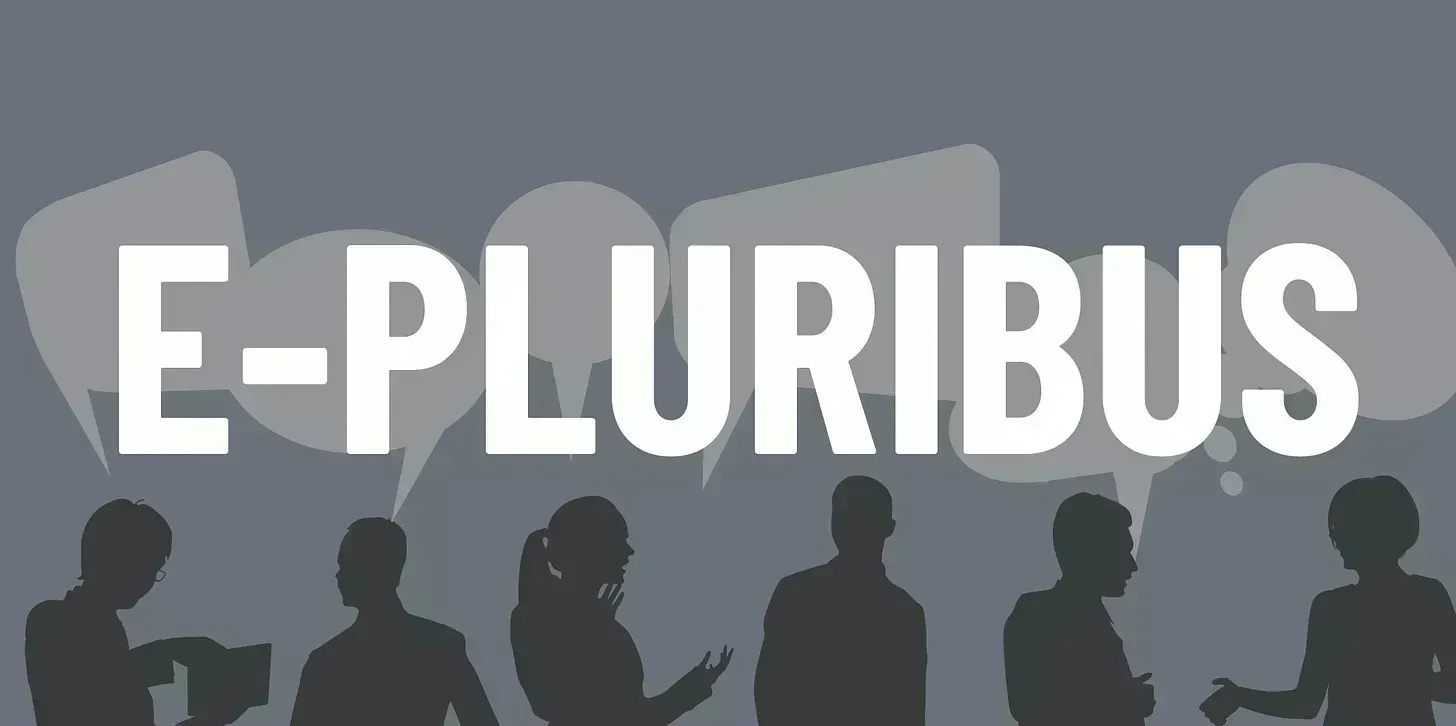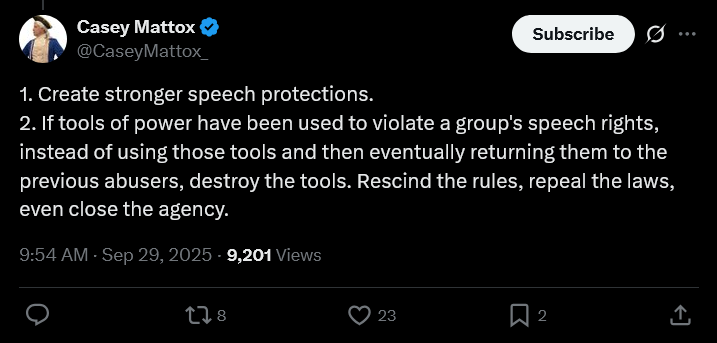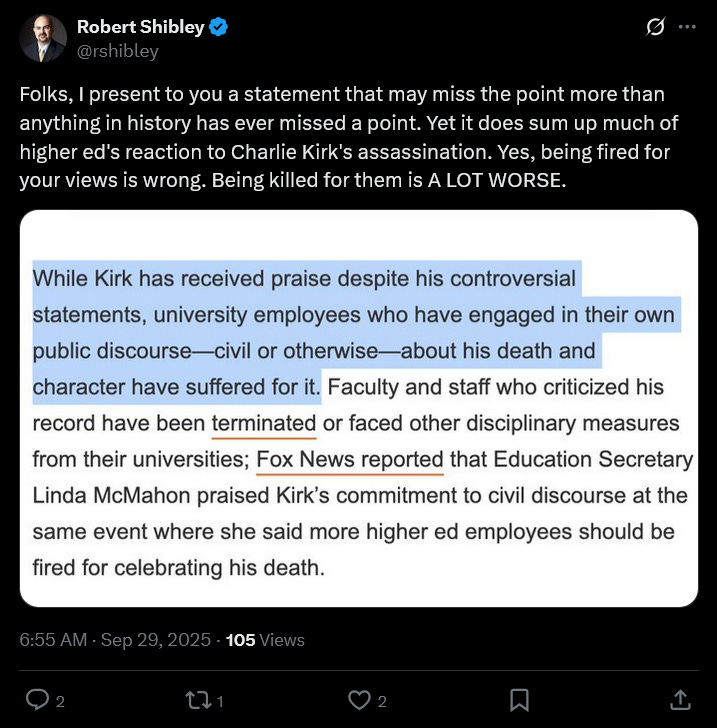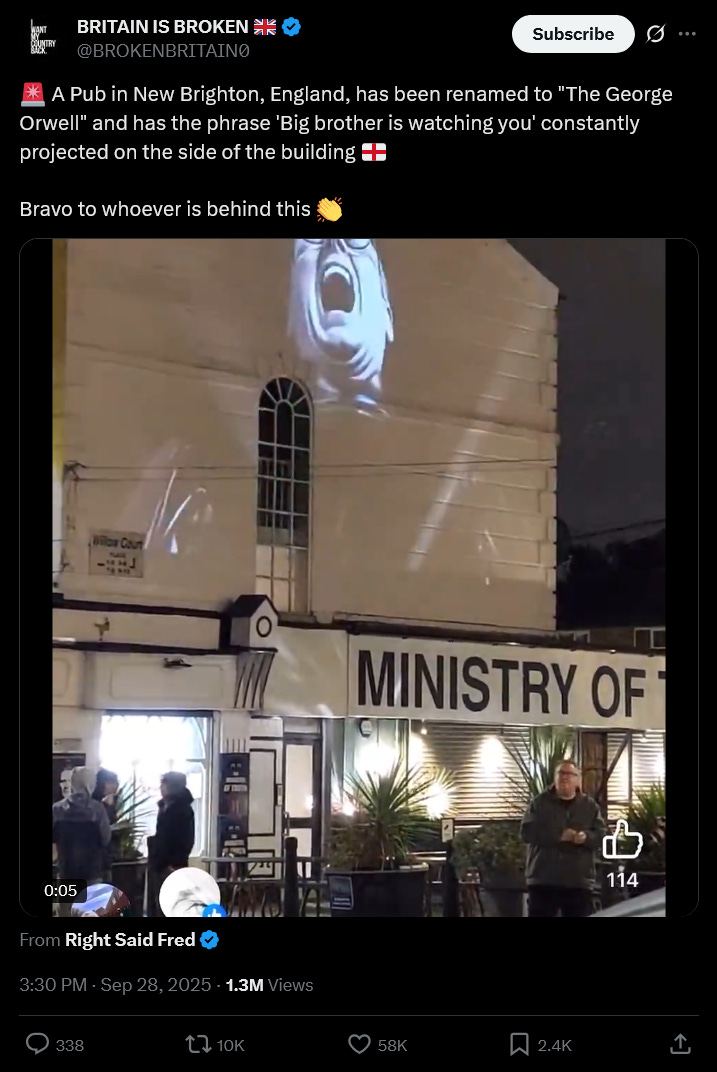E-Pluribus |September 30, 2025
We need better 1A protections, not more censorship. Media 'addiction,' debunked. The case against flag-burning.
A round-up of the latest and best insight on the rise of illiberalism in the public discourse:
Conor Friedersdorf: What Republicans Can Do If They Really Want to Protect Free Speech
Conservatives have lately developed a willingness to use the tools of the state to restrict their opponents’ speech. Turnabout is fair play, they argue. If the Democrats are going to restrict our speech, then we’re going to restrict theirs. Rather than pursue this tit-for-tat strategy against the left, Conor Friedersdorf says the Trump Administration should enact even tougher prohibitions on all censorship:
While out of power, the American right was unified in complaining about the left’s speech policing. Now that Republicans control the White House and Congress, free-speech rights and values are dividing the coalition. One camp thinks Republicans should refrain from policing speech; the other favors policing the left’s speech. The second camp seems ascendant, unfortunately, while the first has failed to turn its beliefs into policy.
The Jimmy Kimmel controversy illustrates the fissure. After the late-night host made misleading comments about the ideology of the man accused of killing Charlie Kirk, Federal Communications Commission Chair Brendan Carr urged ABC to “take action” to address the matter, or else “there’s going to be additional work” for his agency. Senator Ted Cruz, who often sides with the Trump administration, objected on free-speech grounds. “That’s right out of Goodfellas. That’s right out of a mafioso coming into a bar going, ‘Nice bar you have here. It’d be a shame if something happened to it,’” he said on his podcast, warning, “There will come a time when a Democrat wins again” and “they will use this power.” Other Republicans, including Senators Mitch McConnell, Dave McCormick, Rand Paul, and Todd Young, also objected.
In contrast, the activist Christopher Rufo argued that the right must police speech when in power to avoid being dominated by the left. “Turnabout is fair play,” he wrote. “We cannot accept the idea that history started in 2025 or that only the Left can legitimately use state institutions. The only way to get to a good equilibrium is an effective, strategic tit-for-tat.” This “tit-for-tat” approach seems to be part of the Trump administration’s strategy. The Department of Education is policing speech on campus. The secretary of state is policing the speech of leftists with green cards and student visas. Attorney General Pam Bondi recently threatened to “go after” hate speech. President Donald Trump himself said that TV networks that employ hosts who criticize him too much should lose their license.
Yet the idea that “turnabout is fair play” is the best policy to protect speech, let alone the only way to spare the right from future abuse, is nonsense. The best method to secure free speech, for all Americans, is to pass laws that safeguard expressive rights—both now, under Trump, and in the future, regardless of who inhabits the White House. If Republicans are serious about protecting speech, they could pass such laws. And all of the Democrats who have criticized Carr’s comments as an attack on speech could help.
Eugene Volokh: Addiction to Speech and Press
Some opponents of free speech claim that media can be addictive, granting the government authority to restrict access to video games, social media and similar technologies in the name of preventing harms that flow from addiction. At Reason, law professor Eugene Volokh takes a scalpel to the legal basis for this assault on the First Amendment:
In my earlier posts, I argued that concerns about psychological addiction can’t justify restrictions that interfere with behavior presumptively protected by the Free Exercise Clause. If I am correct, this suggests that they likewise can’t justify restrictions with behavior presumptively protected by the Free Speech or Press Clause, which includes most aspects of social media and video game interface design.
[* * *]
As the Court held, “what is good for First Amendment rights of speech”—in the sense of what would justify restricting free speech rights—”must be good for First Amendment rights of religion as well.”[62] And, conversely, the Court concluded, if a restriction on religious behavior can’t be justified by a desire to protect people, a similar restriction on speech generally can’t be, either.[63]
But beyond this, I think most of the arguments against allowing regulations aimed at preventing “addiction to religion” also apply largely equally to regulations aimed at preventing addiction to other First Amendment activities, such as to viewing material on social media or to playing video games. Here, I will discuss how this applies to adults; in later posts, I’ll discuss, among other things, how it applies to children.
Addiction in traditional media and new
Certain features of social media or video games may be harmful for some people, and may be psychologically difficult for them to abandon despite that harm. But they are also enjoyable for other people, indeed probably for most consumers of such expression. And because those features are protected by the First Amendment, it must take a lot—more than just general assertions of supposed addiction and dopamine hits—to justify restricting people’s access to those features, whether through legislation, regulation, or the threat of tort liability.
Ed Feser: Protect Our Flag
Many free-speech defenders (including we here at Pluribus) believe the Constitution protects nearly all expression—even the kind most people find distasteful, such as flag-burning. Nevertheless, there are thoughtful critics who reject our permissive view of the First Amendment. Philosopher Ed Feser is one such critic.
The state is entitled to suppress speech that incites imminent violence, Feser argues, because it disrupts the social order necessary for a stable society. Flag-burning has a similarly harmful (albeit much less severe) effect on society, and the government should restrict it as a result:
Defenders of flag burning lump it in with criticism of political leaders or of government policy, but it is not at all like that. The flag does not represent this or that leader, party, or policy, nor does it represent even any particular form of government. It represents the country itself.
The flag burner is not like someone who merely disagrees with his father. Rather, he is like someone who publicly burns a picture of his father or otherwise publicly shows contempt for him. Political disagreements are like quarrels between family members. Flag burning, by contrast, is like declaring that one not only disagrees with other family members, but has contempt for the family itself.
…
[B]ecause flag burning of its nature tends to undermine unity to some extent, the more common it becomes and the more tolerant people are of it, the greater the disunity that will prevail in a country. The state thus has a legitimate interest in curbing it.
...
[S]ince we are by nature rational social animals, the right to free speech cannot be so broad that it would allow for speech that is positively destructive of reason itself or of the very social order. That would be perverse. Hence governments can legitimately suppress speech that tends to be destructive either of reason or of the social order.
This is why, as even the most ardent advocates of free speech typically acknowledge, it is perfectly legitimate for a government to suppress speech that attempts to incite others to violence, or which defames others. The natural law theorist simply points out that there are also other, less extreme cases where governments have the right to suppress speech that is inherently subversive of the social order.
...
The U.S. Constitution, it might be objected, nevertheless does not permit this ... But there are two problems with this reply. First, the overturning of Roe v. Wade should make anyone think twice before confidently asserting that some controversial matter of constitutional law has been settled. And Texas v. Johnson, I would argue, was, like Roe, simply wrongly decided. The Framers of the Constitution did not lay the foundation for a right to flag burning any more than they laid the foundation for a right to abortion.
Many conservatives suppose otherwise because Justice Antonin Scalia sided with the liberal majority. But ironically, dissenting liberal justice John Paul Stevens was closer to the truth when he stated that the majority were essentially “judicial activists” when pretending to find a right to flag burning in the First Amendment.
The First Amendment rules out laws “abridging the freedom of speech, or of the press.” But no one supposes that the Framers intended this in an unqualified sense. For example, no one thinks they intended to rule out laws prohibiting libelous speech or speech that incites violence. And if the words of the First Amendment do not protect even all forms of speech, they can hardly be said to protect also “all expression” beyond speech (as Scalia claimed they do).
Certainly the First Amendment was intended to protect the expression of certain ideas. But as Stevens and Justice William Rehnquist pointed out in their dissenting opinions on Texas v. Johnson, to prohibit flag burning would in no way prevent the expression of any idea. For any idea the flag burner might want to express in that way could be expressed instead in another way, such as in words.
Moreover, while Scalia was correct to hold that the First Amendment was intended to protect “speech critical of the government,” it is simply a non sequitur to conclude that this protects flag burning. For as I argued above, flag burning goes beyond merely criticizing a particular official, administration, party, policy, or even form of government. It is an expression of contempt for the country itself.
Around X
Echoing Friedersdorf’s argument above, Casey Mattox says the right should just destroy the tools of censorship rather than try to use them against the left.
Robert Shipley argues that many people have learned the wrong lesson from Kirk’s murder. Losing your job for expressing your opinion is awful—losing your life is significantly worse.
Following recent news that the UK is poised to introduce digital ID cards, a pub in Britain has appropriately changed its name.









